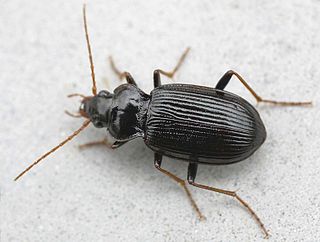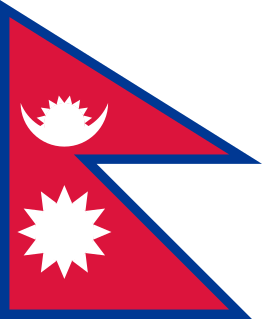Wandoo is the common name for a number of Western Australian Eucalyptus species, all of which have smooth white bark.

Eucalyptus wandoo, commonly known as wandoo or white gum, is a medium-sized tree widely distributed in southwest Western Australia. The Noongar names for the tree are Dooto, Wandoo, Warrnt or Wornt.

Nebria is a genus of ground beetles native to the Palearctic, the Near East and North Africa.

Nebria brevicollis is a species of ground beetle native to Europe and the Near East. In Europe, it is found in all countries and islands except the Azores, the Canary Islands, the Channel Islands, Franz Josef Land, Gibraltar, Madeira, Malta, Monaco, the North Aegean Islands, Novaya Zemlya, San Marino, the Selvagens Islands, Svalbard and Jan Mayen, and Vatican City. It has now been reported as introduced in western Oregon, U.S.A., where it has been found in highly disturbed sites as well as in native old-growth forest stands. It has also now been found in Washington State.

Nebria livida is a species of ground beetle with two subspecies:
Nebria aetolica is a species of ground beetle in the Nebriinae subfamily that can be found in Albania, Greece, and North Macedonia.
Nebria dahlii is a species of ground beetle in the Nebriinae subfamily that can be found in Austria, all states of former Yugoslavia, and Italy.
Nebria fuscipes is a species of ground beetle in the Nebriinae subfamily that can be found in Hungary, Poland, Romania, Slovakia, and Ukraine. The species is black coloured and is 13 millimetres (0.51 in) long.
Nebria hellwigii is a species of ground beetle in the Nebriinae subfamily that can be found in Austria, Germany, and Italy.
Nebria kratteri is a species of ground beetle in the Nebriinae subfamily that can be found in Albania, Greece, Italy, and North Macedonia.
Nebria rubripes is a species of ground beetle in the Nebriinae subfamily that can be found in France and Spain.
Nebria tatrica is a species of ground beetle in the Nebriinae subfamily that can be found in Poland Czech Republic and Slovakia.
Nebria laticollis is a species of ground beetle in the Nebriinae subfamily that can be found in France, Italy, and Switzerland.
Nebria cordicollis is a species of black coloured ground beetle from Nebriinae subfamily that can be found in Italy and Switzerland. The species is 5 millimetres (0.20 in) long.
Mordella capillosa is a species of beetle in the genus Mordella of the family Mordellidae, which is part of the superfamily Tenebrionoidea. It was discovered in 1945.
Somatidia is a genus of longhorn beetles of the subfamily Lamiinae, containing the following species:

Eucalyptus capillosa, commonly known as wheatbelt wandoo, or mallee wandoo, is a species of tree or mallee that is endemic to Western Australia. It has smooth, grey bark, lance-shaped to elliptic adult leaves, spindle-shaped flower buds in groups of nine to thirteen, white flowers and barrel-shaped to cylindrical fruit.
Somatidia capillosa is a species of beetle in the family Cerambycidae. It was described by Olliff in 1889. It is known from Australia.







